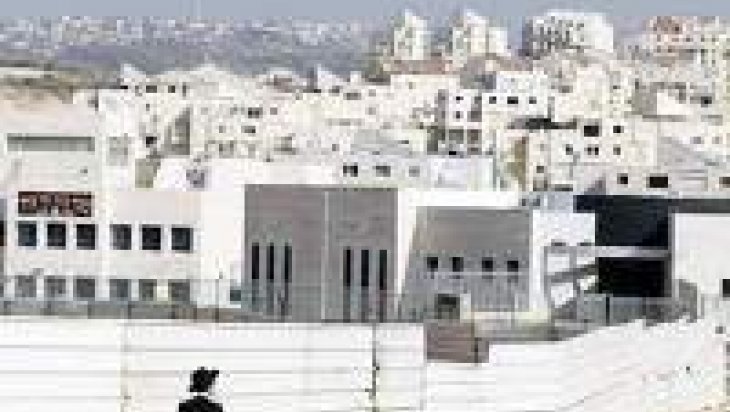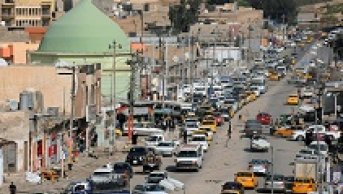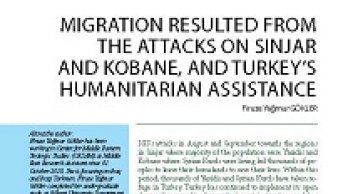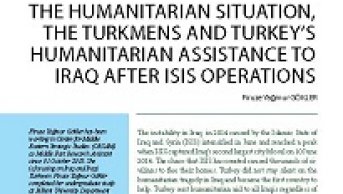A Crisis in Israeli – EU Relations on Construction of Jewish Settlements

Following the Six-Day War in 1967, construction of Jewish settlements in the West Bank and East Jerusalem increased. Israel has some 600 thousand settlers in four main regions in Palestinian territories. These regions are; the Gaza Strip, East Jerusalem, the West Bank, and the Golan Heights.(1) The Gaza Strip, one of these four main regions, was evacuated in 2005; but construction of settlements in other three regions has caused reactions and increasingly continues despite the reactions, decisions and sanctions on the subject in the international arena.
The European Union has talked several times to Israel on the settlements constructed in Palestine, and expressed its opposition and what should be done regarding this issue at every opportunity. Despite the talks held between the parties and international reactions, Israel continues to build Jewish settlements in the aforesaid regions. The European Union and member states started to react to this situation. The EU has been showing its reaction to this attitude of Israel in many aspects, and exerting pressure on Israel to deter it from the aforesaid attitude. During the EU-Israel Customs Cooperation Committee meeting in 2001; it was announced that Israeli products manufactured in settlements in occupied Palestinian territories would not be exempt from paying EU customs duties; and that the decision would enter in force unless a solution was generated on the issue. This gives 250-300 – million – damage to Israel's economy per year.
The European Union reacts to Israel's ongoing attitude towards the issue with another decision on Jewish settlements in July 2013. According to this new decision, the European Union excludes Israel's illegal settlements in the area from EU funding. In other words, the European Union lays down the condition of granting funds to Israel only if used in pre-1967 borders. According to the guidelines, the West Bank and East Jerusalem are located beyond the Israeli borders, and funds to be granted to Israel until 2010 are determined by these guidelines within the scope of the cooperation agreement signed between the European Union and Israel in 1975.
In a statement by EC spokeswoman Maja Kocijancic, she drew attention to illegality of Jewish settlements in the West Bank, and said: “The decision is in line with the EU’s 'long-standing position' that Israel's Jewish settlements are illegal under international law, and the EU doesn’t recognize Israeli sovereignty over the occupied territories.”(2)
Recently Britain, France, Italy and Spain called in Israeli ambassadors to Ministry of Foreign Affairs to protest Israel's illegal construction of settlements in the West Bank and East Jerusalem, and shared their concerns with the ambassadors regarding the issue. These four countries stated that this attitude of Israel would disrupt and give major damage to the Israeli – Palestinian peace process. Among other reactions envisaged by the EU regarding the settlements are as follows: to suspend the strategic dialogue conferences with Israel; to label products manufactured there; and even to impose some sanctions on Jewish settlements.
Israel, on the other hand, strongly criticized EU's aforesaid approaches, and accused the EU of having adopted a biased and tit-for-tat attitude. These developments between the EU and Israel have increased the tension and damaged the relations between the two parties. However, EU has always expressed its concerns to Israel regarding the settlements, and warned Israel to act more careful about the issue. Also, EU highlighted that the steps to be taken by Israel must not have negative impacts on the peace process. Despite all these warnings and sanctions, Israel still continues to construct settlement in those regions; and this situation does not only disrupt the Israeli – Palestinian peace process, but also damages the relations with the EU to a great extent.
(1) Al Jazeera Türk, “Kronoloji: İsrail'in işgal altındaki topraklarda yerleşim faaliyetleri”, http://www.aljazeera.com.tr/kronoloji/kronoloji-israilin-isgal-altindaki-topraklarda-yerlesim-faaliyetleri , Access: 01 February 2014
(2) Euronews, “AB’den Yahudi yerleşimleri dolayısıyla İsrail’e boykot”, http://tr.euronews.com/2013/07/16/ab-den-yahudi-yerlesimleri-dolayisiyla-israil-e-boykot/, Access: 01 February 2014










